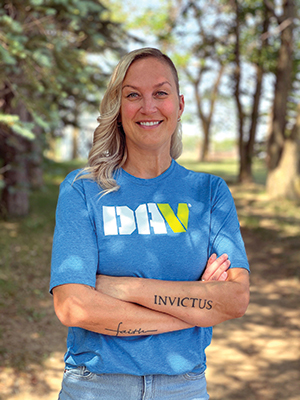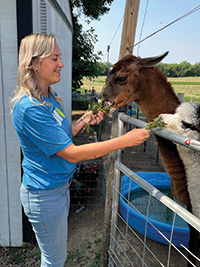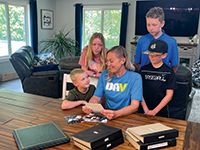 Kim Hubers struggles with the cost of military service every day, but it’s a price mostly hidden from others. No one sees the struggles the Iraq War imposed on the South Dakota Army National Guard veteran.
Kim Hubers struggles with the cost of military service every day, but it’s a price mostly hidden from others. No one sees the struggles the Iraq War imposed on the South Dakota Army National Guard veteran.
Those ailments are far-reaching and affect nearly every one of her organ systems. She has arthritis and bursitis throughout her joints, eight screws in her shoulders, crippling back pain, post-traumatic stress disorder and traumatic brain injury. She also has decreased function in six cranial nerves, including the vagus nerve, which affects digestion, heart rate and the immune system.
However, faced with such constraints, Hubers unfailingly puts others first. She tracks down South Dakota veterans to assist with claims, volunteers her most precious resource—her time—for DAV for countless events, serves as commander for Chapter 1 in Sioux Falls and more.
For her undaunted strength, courage and kindness, Hubers is DAV’s 2023 Disabled American Veteran of the Year.
 That compassion led to donating her business space, a petting zoo about 30 minutes north of Sioux Falls, to raise funds for DAV. Families can enjoy seeing emus, alpacas, donkeys, llamas and other animals.
That compassion led to donating her business space, a petting zoo about 30 minutes north of Sioux Falls, to raise funds for DAV. Families can enjoy seeing emus, alpacas, donkeys, llamas and other animals.
At one of her “farm parties,” she dreamed up an invention for children of deployed service members to connect with their parents. The interactive pillow, which is still in the works, will include pictures of the parent and be equipped with a voice message inside.
“If you’re deployed for six, nine, 12 months, the ability for a child to hear their parent’s voice when they want is nearly impossible,” said DAV Past National Commander Gene Murphy, DAV’s 1984 Disabled American Veteran of the Year. “Just like nearly everything Kim does, it’s impressive.”
Hubers knows the weight of leaving loved ones behind. She deployed with the South Dakota Guard’s 727th Transportation Company to the Middle East in early 2003. She witnessed the kickoff of the Iraq War when a convoy of Marines crossed the border from Camp Coyote, Kuwait, into the desert.
“We could see it, we could hear it, we could feel it,” she said. “As soon as we could, we were rolling into Iraq.”
Hubers recalls watching oil fields set ablaze as she crept further into Iraq. That’s when reality set in: She was in a war zone.
The demanding combat environment forced Hubers behind the wheel of a palletized load system for up to 18 hours a day.
“We would drive anywhere from the port in Kuwait up to Baghdad and back all over again,” she said. “We’d get up before the sun was up and drive past sundown every single day for months.”
Those missions, however, were not without incident. While heading to Fallujah, another company’s truck was hit with an improvised explosive device.
“There were bits of body parts and hair all over the front of their vehicle,” said Hubers. “We would drive by and see tanks and vehicles on fire.”
Hubers was sold on a lifelong military career despite these hardships and the rigors of battle. But that dream was cut short when her wartime service began wreaking havoc on her health. It was migraines at first, which quickly radiated to other areas. Fractures in her mid-spine that never quite healed caused incapacitating back pain. A brain injury went undetected for years until it was determined that a configuration in the driving seat caused Hubers to constantly jostle up, hitting her Kevlar helmet against the ceiling before falling back repeatedly over rough terrain and heavily damaged roads.
These ailments, while invisible, ultimately led to her losing an ROTC scholarship to South Dakota State University. Although she knew these wounds and others stemmed from the Iraq War, the Guard determined they were not due to her service.
She remained in the National Guard, rising to the rank of staff sergeant before medical issues derailed her military career again. This time, it was permanent. Hubers’ ouster became even more painful when she watched her unit deploy to Afghanistan without her.
“To send your team to another conflict and not go with them was devastating to me to this day,” she added.
In the years since, Hubers has found a new purpose in helping her fellow veterans through DAV. As a department service officer, she serves as the eyes and ears for DAV benefits advocate Owen Richards when she’s out in the community.
“She is a huge counterpart to me and a huge extension of my hands and my brain and knowledge,” said Richards, who supervises the DAV office in Sioux Falls. “She’s like a sponge. Right off the bat, she was a go-getter.”
Richards gained Hubers’ trust when he helped her receive VA benefits after years of denials.
“I didn’t know about DAV, and I looked around for who could help with my claim to represent me, and DAV came up,” recalled Hubers. “I called frantic, and they sent me to Owen.”
Her seven-year battle to receive VA benefits led her to the VA’s War Related Illness and Injury Study Center in New Jersey. Over four days, a team of clinicians examined Hubers, trying to put the puzzle pieces together of all her ailments. After a battery of tests and examinations, an exasperated Hubers asked if there were other veterans like her.
“I will never forget, she said to me, ‘Yes, we see everything that you have, but we’ve never seen so much,’” recalled Hubers, “‘and we’ve never seen it as significant in one person before.’”
That experience left her grateful and vindicated after years of being told she must not be disabled based solely on her appearance. Hubers left with an extensive report, which Richards used to help get the VA to award Hubers the benefits she had earned years before.
 “It wasn’t an easy road for her. It was a battle,” said Richards. “They fought her. But DAV supported her, and we took the helm and said, ‘Hey, you’ve done the hard part. Now let us do our part, and let us take care of you.’”
“It wasn’t an easy road for her. It was a battle,” said Richards. “They fought her. But DAV supported her, and we took the helm and said, ‘Hey, you’ve done the hard part. Now let us do our part, and let us take care of you.’”
Her indignation at navigating the murky waters of a complex VA claim was made worse by those who, over the years, constantly assumed she was not disabled.
“I just get so frustrated not being able to get medical care because I don’t look sick, I don’t act sick, I don’t behave like I’m sick,” she added. “I did not get taken seriously by doctors before.”
To this day, Hubers says her time at the study center was lifesaving.
Richards also convinced her to attend DAV meetings regularly; her involvement with the organization has only increased. When local parades come up, the Hubers family is always first to donate its own trucks and farm equipment to represent DAV.
In addition to serving as chapter commander, Hubers sits on DAV’s Interim Women Veterans Advisory Committee, which sets the agenda and informs the organization on the needs of women veterans. In 2022, South Dakota DAV members Helen Parr, Jill Baker and Hubers coordinated the Stand Up for Women Veterans Wellness Retreat, with sponsorship by Chapter 1.
DAV Department of South Dakota Adjutant Martin Pennock said having Hubers is a secret weapon that’s been indispensable, particularly in engaging women veterans.
“She’s been my go-to person for women veterans,” said Pennock. “Women have a different experience many times, unfortunately, and it’s nice to have a woman veteran to lean on to say I’ve got just the right person, because there are those who don’t always feel comfortable talking to a male veteran.”
“We have a lot of women veterans across the entire DAV, but we only have a few in South Dakota,” said Hubers. “But we’re trying to change that.”
Hubers remains a force to be reckoned with and shows no signs of slowing down, despite her evolving health needs.
“I’m overjoyed and proud that we have one of our own to be named the Disabled American Veteran of the Year,” said Murphy. “There’s more to her than meets the eye, and she’s an inspiration.”
Hubers didn’t expect the recognition that comes with the honor. True to her nature, she sees it as another chance to help others.
“I want to do as much good as possible while I’m here,” she said.






